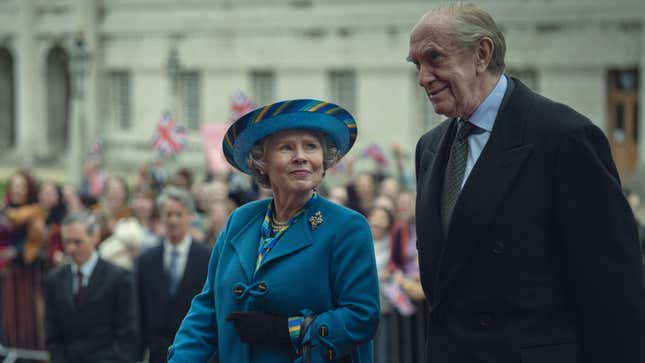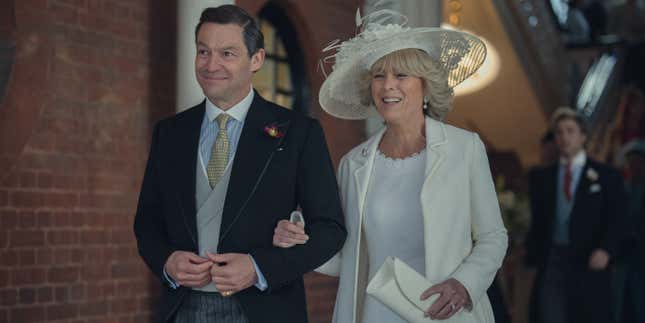
The Crown has reached its end, its obvious conclusion: the death of Queen Elizabeth II (Imelda Staunton). Just kidding. That would have made sense! But no, the finale wraps up in 2005, at the wedding of Charles (Dominic West) and Camilla (Claudia Harrison). The episode’s title, “Sleep Dearie, Sleep,” is named for the song that was played at Elizabeth’s funeral in 2022, and much of this last batch of episodes (which drop December 14 on Netflix) does a lot of nodding and winking at future events that The Crown will never portray.
It’s an odd choice. Creator Peter Morgan has described the show as a love letter to the queen, and as such, it would have made sense for the show to conclude with the end of her reign. Instead, it manufactures an endpoint 17 years before her death but with the specter of mortality hanging over everything as Philip (Jonathan Pryce) and Elizabeth’s advisors pressure her to plan her funeral.
Though the finale does have a real sense of closure to it—both Claire Foy and Olivia Coleman show up for a grand sendoff—part two as a whole opens new storylines it never intends to wrap up. William (Ed McVey) meets Kate (Meg Bellamy) at university, but there is very little introspection into the nature of their relationship. Indeed, Kate essentially has no personality at all. And while The Crown does take care to reveal how Machiavellian Carole Middleton (Eve Best) was in plotting her daughter’s proximity to the future King of England—Kate calls her worse than Mrs. Bennet—it never really examines the problematic nature of her manipulations. What she did was not so different from how Mohamed Al Fayed (Salim Daw) pushed Diana (Elizabeth Debicki) and Dodi (Khalid Abdalla) together, but Carole Middleton is a nice white lady, so The Crown seems more inclined to give her a pass.
And then there’s the Harry of it all. Newcomer Luther Ford plays him from the immediate aftermath of Diana’s death in late 1997 until the wedding in 2005, when Harry was 13 to nearly 21, and let’s just say that it’s tough for a 23-year-old actor to appropriately convey that age range. Throughout the half-season, Harry is referred to as a fuck-up, a black sheep, a likable rogue, and very clear parallels are drawn between him and Princess Margaret (Lesley Manville) and the difficulties associated with being No. 2—or, as the real Prince Harry might say it, the spare. The episodes get into his Nazi costume scandal, his tussles with the press, his weed usage (the horror!), and everyone is worried. Lines are drawn between him and Charles, him and William, and even one fateful conversation with Elizabeth shows how his wishes were overridden by those of his brother. It feels like setting up dominoes for a fall we’ll never get to see. The Crown ends with Harry’s arc hanging midair, depending on us, the viewers, to fill it in with our knowledge of more modern royal history.

For all of the handwringing of royal allies about what a smear job The Crown is, anyone who watches season six has to admit that it’s basically 10 hours of rehabilitation PR for everyone currently still within the system. Camilla is described as “heroic.” Charles gets painted with a broad empathy brush, as does Philip as he leans in to help his son and grandson mend bonds. William is staunchly dutiful. Only Harry is written as a little shit. You almost wonder if Buckingham Palace had a hand in this thing.
And yet when compared to the first part of season six, the back end is mercifully freed from the presence of Diana (both alive and in ghost form). Certainly, she shows up in comparison to her boys—the worldwide obsession with William, the relentless coverage of Harry’s misdeeds—but without the character dominating every scene and conversation, The Crown is able to dive back into areas where it excels. Episode six, “Ruritania,” in particular plays quite the clever trick of having Tony Blair (Bertie Carvel) pick apart all of the out-of-touch elements of the royal establishment, only to make the case for such things with careful writing and scene construction. Sure, it doesn’t seem rational to walk away thinking it makes sense for the monarchy to have a position entirely devoted to swan care, and yet The Crown showcases what Elizabeth calls an “extraordinary array of precious expertise.” There’s an argument for the preservation of history and tradition that feels both tender and pointed. A love letter, indeed.
But the ending—which makes a grand sweeping statement about Elizabeth’s singularity, about how she alone was built for such a role and was called to see it through until her death—ultimately undercuts itself by deciding to turn the lights off before her death. That’s not to say that The Crown still had interesting things to say; it most likely did not. But as Elizabeth decides against passing the crown to Charles, it feels like a betrayal of The Crown’s thesis to determine that the final two decades of Elizabeth’s life were not relevant to her story.
The Crown season 6, part 2 premieres December 14 on Netflix